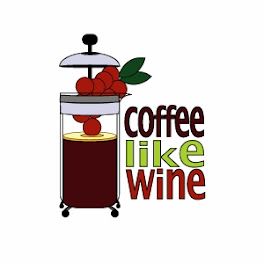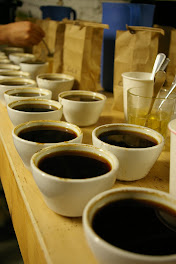Two guys from San Jose-based Barefoot Coffee Roasters came to our company office today to explain a bit about what they do and to show off some of their offerings, in hopes that we will switch our current beans to theirs.
If want to have a better understanding of the difference between regular coffee and specialty coffee, and get a sense of the real-world effect of creating a market for carefully grown beans, talk to either Andy Newbom, Barefoot's founder and owner, or Tony Serrano, a "Coffee Wrangler" according to his business card. Their passion for coffee and the farmers they buy beans from is highly infectious.
Andy talked about his travels through South America visiting farmers and forging relationships to buy beans directly. Tony talked about how coffee plants grown hundreds of yards apart could taste very different when picked, roasted and brewed just based on terroir. And it was noticeable to everyone who tried the coffees.
They made four different coffees for us, and the reaction from co-workers was great. "Wow, it's so sweet you don't even need to add milk or sugar!" said one. Tony said that's one of the things he likes to hear best from people. That sentiment is a realization that coffee doesn't have to be cheap, over-roasted swill that need to be polluted with milk and sugar to make it palpable.
The two coffees that made the biggest impression were a Guatemalan Nahuala and an Ethiopian Harrar Illili Darartu. Both were sweet, perfumed cups, with the Nahuala bringing more of a citrus, fruity nose and taste on the tongue, and the Harrar, a natural, or dry processed coffee, having a rich berry scent and strong mid-palate punch of red berries.
I love natural, or dry-processed coffees. Coffee beans grow on trees, in fruits called cherries. Most coffee that you'll have comes from a washed process, where the cherries are picked, and then removed to reveal the coffee bean inside. This process will give the coffee a "brighter" flavor, meaning that it has a little more acidity and hit you with a tang on the front of your tongue. Dry processed coffees are from cherries that are picked then allowed to dry out for a few weeks with the coffee bean inside. This gives the beans a unique taste and flavor profile not found in washed coffees as it absorbs more of the flavor from the fruit itself. These coffees have a deeper flavor, they seem to hit more notes on the back of your tongue than washed coffees. For a lot more info on the different ways of processing coffee cherries, check out this page.
Dry processed coffees can easily turn out bad beans if the drying conditions aren't ideal. Typically they are left to dry in the sun, outside. If there is too much moisture in the air or on the ground, the beans will become mildewy, thus giving the beans a funky, unpleasant flavor. So roasters have a hard time sourcing dry processed beans that are consistently good. These beans, however, didn't suffer from this problem.
It was great to be able to hang out with these guys and just talk coffee for an hour, but what was even better was being able to get other people excited about coffee as well. Someone walks by, and you ask them to try some coffee, they look skeptical and uninterested, but they do anyway, and 20 minutes later, they've learned a little bit about where the coffee came from, why it tastes so radically different from every other coffee they've ever had, and they leave with a new sense of interest in single-estate coffee. What a fun way to spend an afternoon.
Thursday, August 14, 2008
Subscribe to:
Post Comments (Atom)









No comments:
Post a Comment